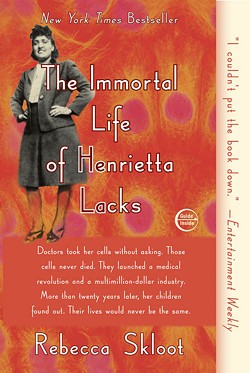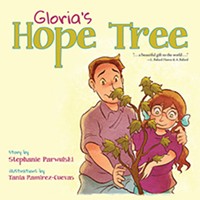Book review: The Immortal Life of Henrietta Lacks by Rebecca Skloot
In 1951, Henrietta Lacks was a spirited, 31-year-old African-American mother of five, originally from the tobacco farms of Virginia, but living at the time in Baltimore. She was diagnosed and treated for an unusually virulent case of cervical cancer at Baltimore's Johns Hopkins hospital. Doctors could do little to treat Lacks, other than give her brutal radiation treatments that turned the café-au-lait-tinted woman's midsection jet-black. She died an agonizing death and was buried in an unmarked grave next to her mother's headstone.
Before she died, however, a sample of Lacks' cancerous tissue was taken without her knowledge or consent, as was common then. For years, doctors had tried unsuccessfully to grow living human cells that could be used to standardize medical testing. With the tissue from Henrietta Lacks, they hit the jackpot. Not only did her cells survive, they thrived to a degree previously unseen, becoming the "first immortal human cells," code-named HeLa, which grew — and are still growing — by the trillions in labs worldwide. Henrietta's cells became the building blocks for many of modern medicine's greatest accomplishments and innovations, from the polio vaccine to chemotherapy to AIDS treatments. But who was the woman the cells originally came from? And what did her family think about Henrietta's strange new immortality?
Author Rebecca Skloot spent a decade gathering different story strands, and then wove them into a web-narrative that garnered nearly unanimous rave reviews from critics. It's easy to understand the praise; The Immortal Life of Henrietta Lacks is a rich, fascinating story that reads like a novel, and stays with you long after you've put it down.
For years, the HeLa donor's identity was a mystery, but in the 1970s, impelled by reporters' questions, Henrietta's name was gradually revealed. Astonishingly, this was the first time Lacks' husband and children had ever heard of the HeLa cells. Skloot tells the story of those cells and what they've meant to medicine, while also painting a portrait of Lacks' family, struggling to come to terms with Henrietta's death, her legacy and their own suspicions and anger.
Skloot is a remarkable writer, straightforward, vivid, empathetic and relentless in searching out the connections between different eras. Her growing closeness and commitment to Henrietta's daughter Deborah, as they work together to find all they can about HeLa cells and Henrietta's life story, is moving, and worth the price of the book alone. The book's narrative, plainly told and without judgment, contrasts the miracles produced in modern medical labs with some family members' beliefs in spirits and their mother's ongoing presence. And then there's the increasingly conspicuous contrast between the latest modern medical breakthroughs with the fact that, for the most part, Henrietta's grown children can't afford health insurance to take care of diseases their mother's cells helped cure.
If reviewers could offer readers money-back guarantees for certain books they read, I would do that right now.
Latest in Books
Calendar
-

WHISKEY TASTING: VIRGINIA HIGHLANDS WHISKY @ Elizabeth Parlour Room
-

NEW WINDOW GALLERY-Pat Rhea-ACRYLIC PAINTINGS-April 05-30 2024 VALDESE, NC 28690 @ New Window Gallery/Play It Again Records
- Through April 30, 12 p.m.
-
An Evening With Phil Rosenthal Of "Somebody Feed Phil" @ Knight Theater
-
Kountry Wayne: The King Of Hearts Tour @ Ovens Auditorium
-

Trap & Paint + Karaoke @ Zodiac Bar & Grill
-
Halloween Guide 2016
31 spooktacular things to do in the Q.C.
-
The joy and pain of comedian Oletha Cuevas 2
-
Jessica Moss Makes the Gantt Center a Safe Zone for Local Artists 2
Flipping the script












